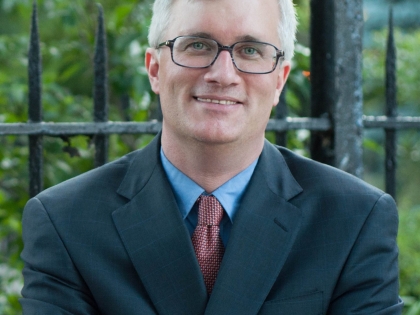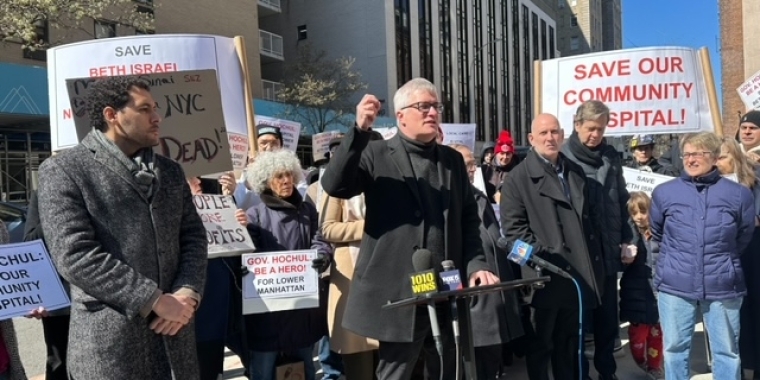
Senate Housing Chair Brian Kavanagh On Budget Negotiations, The Future Of Good Cause
New York lawmakers finally ratified the annual state budget last week, a deal that came more than a month after the deadline and free of any new policies aimed at addressing the housing crisis.
While Gov. Kathy Hochul in January revealed an ambitious goal of creating 800,000 new housing units across the state in the next decade, none of the policies she put up — mandating municipalities to grow their housing stock and lifting the density cap for New York City residential structures among them — were approved. Nor was the controversial so-called Good Cause Eviction legislation. The result was a bitter disappointment for tenant and landlord advocates.
In an interview with Bisnow on Thursday, after the budget’s passage Wednesday night, Senate Committee on Housing, Construction and Community Development Chair Brian Kavanagh said there is still time for housing policies this session, and that he will continue to push forward with Good Cause legislation. He also defended the $229B budget that was passed, which included new rental assistance funding.
Bisnow: It doesn't seem like there are any real proposals for housing that went through [the budget]. You represent the lower part of Manhattan, how do you expect constituents to react to that outcome?
Kavanagh: There were some very big policy proposals the governor had put on the table at the beginning, and much of the policy changes were not included in the budget. But we had some good success at making money available for critical priorities. The budget is principally about money, although there's always an effort to try to achieve policy goals as well. It's a mixed bag. I was optimistic that we might also make some progress on policy, but we have opportunities to do that. We have 36 days left in session.
In terms of the upside, we included $366M to cover the rest of the people who had applied for assistance during Covid.
There was a provision that prevented residents of public housing and residents housing paid for by Section 8 and other voucher programs from getting that assistance. This has been a multibillion-dollar program. The state already had put in more than a billion dollars for that program, but $366M of new money in the expense budget is a very big deal, and I'm very pleased that we're able to do that. My constituents who live in public housing and Section 8 developments — of which there are many — I think, have been focusing on that a lot and will be very pleased to see that getting done.
We also have $130M of new capital money for public housing. The Homeowner Protection Program — which is about people facing foreclosure and other threats to their homeownership — we are funding that at $40M, which is a record. We had upped that last year from $20M to $35M a year. So doing that at $40M is a recognition for a lot of people that are still digging out of the difficulties that came up during Covid.
We also increased the amount of money we spend to ensure that people have attorneys when they're facing eviction. We're doing $50M for that. Last year's number was $35M. That's a recognition that a lot of people are struggling and need good advice. There are just other programs we fund routinely to support creation of new housing. There's a $51M homeless housing fund. There's a great deal of money we're putting on the table. We continue to be spending generously.
We did a $5.5B, five-year capital plan last year and this year's budget expands on that. So in terms of budgets being most basically about putting financial resources toward a problem, this budget is, I would say, somewhat successful in that regard. But we did not get agreement on some of the things the governor proposed to increase production.
There's a lot of focus on the suburban elements of that, but there were also some changes to city law that the governor had sought. We also did not get an agreement on something I've pushed for for a long time, which is a new rental assistance program called Housing Access Vouchers. And we didn't get agreement done [on] additional eviction protections, commonly known as Good Cause Eviction protections, which is basically the notion that you can't be evicted if you're paying your rent and meet your obligations as a tenant. You can't be evicted for no good reason.
So a lot of those policy issues are still on the table. But with the exception of housing access vouchers — which is hard to do outside the budget because it requires an expenditure of money to cover rental assistance — the rest of them are things that can be done outside of a budget negotiation. So I think negotiations about much of that will continue.
Bisnow: For 36 days? There's not a huge amount that can get done in 36 days.
Kavanagh: I don't agree. The legislative session tends to happen broadly in two phases. We can pass any kind of bill at any point in the year, but typically, there is a process during which we negotiate the budget, including some policy issues. And then there is a subsequent process that happens toward the end of the session and much of the big priority legislation that gets done, gets done in the last few weeks of session each year.
Obviously time is tighter because the budget was almost five weeks late. But I had a housing committee meeting this morning and moved eight bills to the floor. And we will continue to push hard for agreement ... to advance our priorities. We had an announcement last week of a big package on deed theft, which is a huge issue in New York City. That's a big priority. We've been working with the attorney general's office and my colleagues, Sen. Myrie and Assembly member Helene Weinstein, and again that is something that also I hope to get done by the end of the year, in addition to some of the things I just mentioned.
Bisnow: So were are you, or are you, supportive of all of the governor's measures, or was there opportunity to negotiate on some of the components — raising the city's [floor-area ratio] cap, for example. Or was it kind of all or nothing?
Kavanagh: The governor put very worthy proposals on the table. I was in the audience when she spoke at the luncheon of the Housing Conference back in October and announced big things. I've been broadly supportive over the last couple of years of the notion of requiring localities to permit an increase in production. I think it's reasonable to expect that we would have a negotiation about the details.
For example, with respect to FAR increase, you know, I think, the current law is a 12 FAR cap that applies only in New York City and only to housing. I think it's reasonable to expect that if we're going to raise that, that we would require that some affordability come out of that. There were some negotiations about not just whether we would raise the FAR cap, but how we would raise it.
Again, [there were] negotiations on that issue, on the 421a construction period extension, on conversions from commercial to residential and basements in Queens, which I've been trying to address for at least two years now. All of those things were things the governor came out for, in some cases, replicating language that I had introduced in the Senate and in some cases, coming up with their own proposals.
I think it was reasonable for the governor to call for those negotiations to happen during the budget. There was, I think, vigorous effort to get them done in the budget but they didn't. That doesn't mean they can't be negotiated outside the budget.
Bisnow: You've been trying to get ‘Good Cause’ through since 2019. What happened there? Are you giving up on it or are you going to keep pushing for it and try and get it done in the legislative session?
Kavanagh: No, absolutely. I'm not giving up on it. I think there was some hope. I mean, again ...
Bisnow: What happened with it? Why did it fall apart in that way?
Kavanagh: There wasn't an agreement to do it.
Bisnow: Why?
Kavanagh: The budget negotiations are such that the governor puts her priorities on the table as part of the executive budget proposal, and then each house in the legislature passes a resolution. So the executive budget is more or less the governor saying 'If it were entirely up to me, this would be the budget.' And then each house of the legislature does what's sometimes called the one-house resolution, but it's basically our resolution which more or less says 'If it were up to us on the budget we're passing tonight. These will be our priorities.'
And so both houses of the legislature called for Housing Access Vouchers and Good Cause, and there were some negotiations around that, but there was not agreement. Again, Good Cause eviction does not require state spending, so there's no particular reason why it needs to be done in the budget. But there was an effort to include as part of a broader agreement, and that effort fell short.
I will say, today, the morning after the budget passed, I don't think it's possible to have a clear sense of which of these items will be negotiated in the next 36 days. But I am certainly not giving up, especially on the core priorities of Good Cause and rental assistance to prevent people from being homeless or evicted because they can't afford their rent.
I think we're going to continue conversations about about many of these items. I think everybody needs to take a breath after the budget negotiations that concluded last night at almost midnight. But no one's taking a break. We're still in session, actively pursuing our agenda on housing and on many other issues as well.
Bisnow: I understand that it kind of fell apart because —and this is what I've read as a characterization — that some legislators wouldn't agree to give up local control on zoning and those in support of Good Cause Eviction wouldn't accept a deal for all the other measures without an agreement on that legislation. So was that you? Did you say 'I'm holding firm on Good Cause?'
Kavanagh: I don't want to characterize what any party to the negotiations said at the table at various times. This was a several month negotiation. I will say that, I think Good Cause is a critical priority and I think it's also critical that we require increases in housing.
But this is a multiparty negotiation. There are 213 members of the legislature and the executive staff and the leadership and the staff of each house. There were a lot of conversations over time. I was actively negotiating toward getting what we could right to the end. The budget is 32 days late and at some point, you need to decide what you have agreement on and put that together and pass it and that's what happened.
I don't want to be saying the governor got any element of her plan exactly right. There were technical concerns that were legitimate about how affordability was being incentivized by her proposals, about the particulars of the transit-oriented development proposal, and of course about how you're going to do commercial conversions. I have my own bill on commercial conversions, which I amended last week, and I'm planning to move forward with.
I think we're all going to continue to try to get positive things done and I think that, for me, Good Cause eviction and housing access vouchers are a priority, but so are commercial conversions done the right way and some other things.
Bisnow: The housing advocates are really mad about it. The Real Estate Board of New York's really mad about it, and the head of the Housing Conference described the legislature as full of people who got there saying they would fix the housing crisis when they were running for office, or at least try to, but have now capitulated to NIMBYs, and I'm quoting here, "who just want the status quo." Do think that's fair?
Kavanagh: I think every legislator has to assess what voters and their constituents want. There are strong differences of opinion about that. I am, I think it's fair to say, not characterized as a NIMBY. I have been on the record for quite some time saying we need to loosen restrictions that local governments are able to propose to prevent production of housing.
But having said that, I don't think finger-pointing and condemnation is terribly useful. Voters and constituents of legislators should engage in this question of what they want, and the No. 1 thing my constituents tell me they want to address is the housing crisis, affordability and the scarcity of housing and homelessness. I think that's probably true for a lot of us. That ought to be a motivating factor.
We have diverse perspectives and diverse districts, and I am somebody sitting in my district in Lower Manhattan and chairing the Housing Committee that thinks we should do more to try to make sure that we're building housing in all parts of the state, including some of the suburbs of New York City that have been very resistant to housing. Long Island — Nassau and Suffolk County — produce housing at a rate that is about one-fifth of the national rate per capita, even though we live in a country that has a housing shortage, nationally. I think we should do something about that.
I was broadly positive about the governor's proposed solutions about that. We didn't get them done in the budget. We did do a bunch of very important positive things in the budget. I'm not going to spend time pointing fingers and tearing down the perspectives of colleagues. I'm going to work to get agreement on some things we can do that would be positive.



